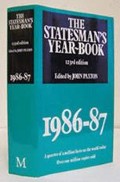Abstract
Anguilla was probably given its name by the Spaniards because of its eel-like shape. After British settlements in the 17th century, the territory was administered as part of the Leeward Islands. From 1825 it became more closely associated with St Kitts and ultimately incorporated in the colony of St Kitts-Nevis-Anguilla. Opposition to this association grew and finally in 1967 the island seceded unilaterally. Following direct intervention by the UK. in 1969 Anguilla became de facto a separate dependency of Britain; and this was formalized on 19 Dec. 1980 under the Anguilla Act 1980. A new Constitution came into effect in April 1982.
Access this chapter
Tax calculation will be finalised at checkout
Purchases are for personal use only
Book of Reference
Petty, C. L., Anguilla: Where there’s a Will, there’s a Way. Anguilla, 1984
Editor information
Copyright information
© 1986 Palgrave Macmillan, a division of Macmillan Publishers Limited
About this chapter
Cite this chapter
Paxton, J. (1986). Anguilla. In: Paxton, J. (eds) The Statesman’s Year-Book. The Statesman’s Yearbook. Palgrave Macmillan, London. https://doi.org/10.1057/9780230271159_9
Download citation
DOI: https://doi.org/10.1057/9780230271159_9
Publisher Name: Palgrave Macmillan, London
Online ISBN: 978-0-230-27115-9
eBook Packages: Palgrave Political & Intern. Studies CollectionPolitical Science and International Studies (R0)

